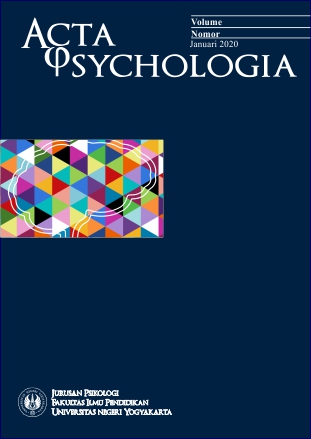Hubungan Growth Mindset dengan Perilaku Kepemimpinan pada Mahasiswa
DOI:
https://doi.org/10.21831/ap.v4i1.51706Keywords:
growth mindset, leadership practices, college students, organization.Abstract
Perilaku kepemimpinan dan mindset yang dimiliki pemimpin memengaruhi bagaimana suatu organisasi berjalan. Penelitian ini bertujuan untuk mengetahui hubungan antara growth mindset dengan perilaku kepemimpinan pada mahasiswa yang aktif berorganisasi. Sejumlah 112 mahasiswa (Musia= 21,28; SDusia= 1,36) terlibat penelitian dengan mengisi skala growth mindset (α=0,741) dan skala perilaku kepemimpinan (α=0,947). Data dianalisis menggunakan korelasi product moment dari Pearson. Koefisien korelasi yang didapatkan adalah 0,369 dan koefisien determinasi (R2) sebesar 13,6%. Hasil penelitian menunjukkan hubungan positif antara growth mindset dengan perilaku kepemimpinan pada mahasiswa yang aktif berorganisasi. Mahasiswa dengan growth mindset tinggi akan lebih sering menunjukkan perilaku kepemimpinan. Sebaliknya, semakin tinggi perilaku kepemimpinan semakin tinggi growth mindset yang dimiliki pemimpin tersebutReferences
Bella, M., & Maichal. (2018). Pengaruh mindset, kepemimpinan, dan nilai keluarga terhadap budaya organisasi perusahaan keluarga. DeReMa Jurnal Manajemen, 13(1), 121–138.
Bligh, M. C., Kohles, J. C., & Yan, Q. (2018). Leading and learning to change: The role of leadership style and mindset in error learning and organizational change. Journal of Change Management, 18(2), 116–141.
Canií«ls, M. C. J., Semeijn, J. H., & Renders, I. H. M. (2018). Mind the mindset! The interaction of proactive personality, transformational leadership and growth mindset for engagement at work. Career Development International, 23(1), 48–66.
Dancey, C. P., & Riedy, J. (2007). Statistics without maths for psychology (4th ed.). Harlow: Pearson Education Limited.
Dweck, C. S. (1999). Self-theories: Their role in motivation, personality, and development. New York, NY, US: Psychology Press.
Dweck, C. S. (2006). Mindset: The new psychology of success. New York, NY, US: Random House.
Dweck, C. S., & Yeager, D. S. (2019). Mindsets: A view from two eras. Perspectives on Psychological Science, 14(3), 481–496.
Gonfa, B. D. (2019). Effects of poor leadership skill in organization: Evidences. Arabian Journal of Business and Review, 9(2), 1–5.
Hao, M. J., & Yazdanifard, R. (2015). How effective leadership can facilitate change. Global Journal of Management and Business Research: A Administration and Management, 15(9), 0–6.
Heslin, P. A., & Keating, L. A. (2017). In learning mode? The role of mindsets in derailing and enabling experiential leadership development. Leadership Quarterly, 28(3), 367–384.
Humas & Layanan Publik Universitas Negeri Yogyakarta. (2021). Kemahasiswaan Organisasi Mahasiswa (Ormawa). Diambil 29 April 2021, dari https://www.uny.ac.id/kemahasiswaan
Insan, A. N., Masmarulan, R., & Yasin, N. A. (2021). Transglobal leadership as a driver for increasing the employee performance. International Journal of Organizational Leadership, 10, 54–71.
Khajeh, E. H. Al. (2018). Impact of leadership styles on organizational performance. Journal of Human Reseources Management Research, 2018, 1–10.
Kouzes, J. M., & Posner, B. Z. (2007). The leadership challenge: How to get extraordinary things done in organizations (4th ed.). San Francisco, CA, US: Jossey-Bass.
Kouzes, T. K., & Posner, B. Z. (2019). Influence of managers' mindset on leadership behavior. Leadership and Organization Development Journal, 40(8), 829–844.
Limeri, L. B., Carter, N. T., Choe, J., Harper, H. G., Martin, H. R., Benton, A., & Dolan, E. L. (2020). Growing a growth mindset: characterizing how and why undergraduate students' mindsets change. International Journal of STEM Education, 7(1).
Mozhgan, A., Parivash, J., Nadergholi, G., & Jowkar, B. (2011). Student leadership competencies development. Procedia - Social and Behavioral Sciences, 15, 1616–1620.
Ng, B. (2018). The neuroscience of growth mindset and intrinsic motivation. Brain Sciences, 8(2).
Posner, B. Z., & Kouzes, J. M. (1988). Development and validation of the leadership practices inventory. Educational and Psychological Measurement, 48(2), 483–496.
Rosch, D. M., & Collins, J. D. (2017). The significance of student organizations to leadership development. New Directions for Student Leadership, 2017(155), 9–19.
Smith, L. J., & Chenoweth, J. D. (2015). The contributions of student organization involvement to students self-assessments of their leadership traits and relational behaviors. American Journal of Business Education (AJBE), 8(4), 279–288.
Sugiyono. (2012). Metode Penelitian Kuantitatif Kualitatif dan R&D. Bandung: Alvabeta.
Wang, D., Yuan, F., & Wang, Y. (2020). Growth mindset and academic achievement in Chinese adolescents: A moderated mediation model of reasoning ability and self-affirmation. Current Psychology, 1-10.
Downloads
Published
How to Cite
Issue
Section
License
Acta Psychologia allows readers to read, download, copy, distribute, print, search, or link to its articles' full texts and allows readers to use them for any other lawful purpose. The journal allows the author(s) to hold the copyright without restrictions. Finally, the journal allows the author(s) to retain publishing rights without restrictions
- Authors are allowed to archive their submitted article in an open access repository
- Authors are allowed to archive the final published article in an open access repository with an acknowledgment of its initial publication in this journal

This work is licensed under a Creative Commons Attribution-ShareAlike 4.0 Generic License.










